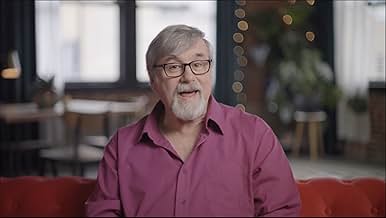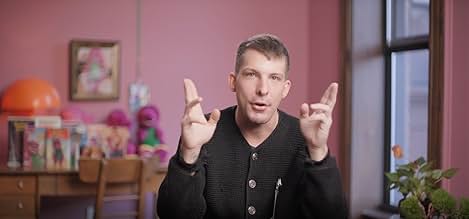Barney el dinosaurio, expone la necesidad humana de odiar. Y nos preguntamos: ¿Se ha quebrado algo en la sociedad estadounidense?, o ¿siempre ha sido así?Barney el dinosaurio, expone la necesidad humana de odiar. Y nos preguntamos: ¿Se ha quebrado algo en la sociedad estadounidense?, o ¿siempre ha sido así?Barney el dinosaurio, expone la necesidad humana de odiar. Y nos preguntamos: ¿Se ha quebrado algo en la sociedad estadounidense?, o ¿siempre ha sido así?
Explorar episodios
Argumento
¿Sabías que…?
- ConexionesFeatured in AniMat's Crazy Cartoon Cast: My Father's Purple Dragon (2022)
Opinión destacada
I used to like Barney when I was younger, but I'm now neutral to it. However, I agree or used to agree with some of the criticisms it has received and used to make fun of some of them (e.g., Barney's voice sounding dopey, some of the songs being annoying, the series being set in a perfect world, etc. I still hate these aspects, minus the setting being "perfect"). I'm also aware that there's a Wikipedia page for anti-Barney humor. I decided to watch I Love You, You Hate Me because I was intrigued when I read about it in an article and saw the trailer, and I have to admit that it was a good documentary! There are people from media that I like who are involved in this, like Steve Burns from Blue's Clues, Bill Nye the Science Guy, and a few others. I was already neutral to Barney before watching it, but I've warmed up to Barney a little more because of this doc.
After learning more about Barney from the doc, it's clear that some people take the popular children's character too seriously. Barney the purple dinosaur is known for loving and accepting everyone for who they are, and I don't understand how anyone could go wrong with that. Friendship and acceptance are essential themes of the show. A couple of the child (now adult) actors from the early seasons of Barney shared experiences of racism before it came along, and they found acceptance and appreciation during their time on the show. However, after leaving the show and going back to school, they faced bullying from their peers for their involvement with Barney and struggled with coping mechanisms such as smoking and drinking. It's heartwarming that they found acceptance on the show, but it's sad to hear about the challenges they faced before and afterward.
Unfortunately, there have been instances of bullying and mistreatment directed at Barney's fans and the show's cast and crew, including death threats via emails and name-calling. It's disheartening to hear that some individuals have targeted Barney fans and the show's personnel with harassment, threats, and destructive behavior. This behavior does not align with Barney's core values, which include love, inclusion, and acceptance. It's important to remember that everyone is entitled to their own opinions, and it's okay if someone doesn't like Barney. However, it's essential to treat others with respect and consideration and to acknowledge the positive impact the show has had on many individuals, regardless of differing preferences.
The documentary also talks about the negative reception Barney received when it first aired in the 1990s. Some people criticized the show for not being edgy, reflecting a cultural tendency toward cynicism at the time. It's noted that the rise of the internet during that era also contributed to the backlash the show faced. It's worth remembering that just because something isn't considered edgy doesn't mean it sucks. If every show/movie were edgy, the TV/movie industry would be boring and unoriginal. If people had given Barney a chance, they might have liked it.
The text also draws a parallel between the criticism faced by Barney and what Sesame Street might have experienced if the internet existed during its early years. It's acknowledged that some people might not like Barney, and that's okay.
Barney's head writer, Steve White, emphasized that the show aimed to inspire viewers to make the world a better place. He addressed criticisms about the show's seemingly perfect setting, highlighting that the characters also faced challenges and conflicts, such as Baby Bop getting a stomachache after eating too many cookies, the kids getting scared of a grizzly bear, the characters losing a Christmas star, Barney and the kids trying to help BJ and Baby Bop settle an argument, and more. Additionally, Hit Entertainment created more episodes with conflict-based plots in response to feedback about the show's setting when they acquired the rights to it. The characters are indeed happy most of the time, but why shouldn't they be? What do you expect them to do? Mope around like a bunch of goths? Also, these items made me realize that the criticisms about the perfect setting were somewhat invalid. Despite differing opinions, many people appreciate the valuable life lessons imparted by Barney, even if they don't particularly enjoy the show itself.
Steve Burns asked the rest of the crew, "Who was your Barney growing up, and how would you feel about a room full of people hating on him/her?" Their "Barneys" included their teddy bears, Elmo, Bert and Ernie, Big Bird, and numerous other characters and toys, and they didn't like the idea of a room full of people hating on them. I must say that they hit the nail on the head with those lines! Even though I grew up with Barney, I think it'd be safer to say that my "Barney" was either Charlie Brown, Winnie the Pooh, Mickey Mouse, SpongeBob, or all of the above, and I REALLY wouldn't want to be in a room full of people hating on either of them. You probably wouldn't like the idea of a room full of people bashing your favorite toy(s) or character(s) either.
In conclusion, whether you love or hate Barney, "I Love You, You Hate Me" offers a fresh perspective that may change your feelings about the character. Even if you're a Barney fan, this documentary is worth watching to gain a deeper understanding of the public's perception.
After learning more about Barney from the doc, it's clear that some people take the popular children's character too seriously. Barney the purple dinosaur is known for loving and accepting everyone for who they are, and I don't understand how anyone could go wrong with that. Friendship and acceptance are essential themes of the show. A couple of the child (now adult) actors from the early seasons of Barney shared experiences of racism before it came along, and they found acceptance and appreciation during their time on the show. However, after leaving the show and going back to school, they faced bullying from their peers for their involvement with Barney and struggled with coping mechanisms such as smoking and drinking. It's heartwarming that they found acceptance on the show, but it's sad to hear about the challenges they faced before and afterward.
Unfortunately, there have been instances of bullying and mistreatment directed at Barney's fans and the show's cast and crew, including death threats via emails and name-calling. It's disheartening to hear that some individuals have targeted Barney fans and the show's personnel with harassment, threats, and destructive behavior. This behavior does not align with Barney's core values, which include love, inclusion, and acceptance. It's important to remember that everyone is entitled to their own opinions, and it's okay if someone doesn't like Barney. However, it's essential to treat others with respect and consideration and to acknowledge the positive impact the show has had on many individuals, regardless of differing preferences.
The documentary also talks about the negative reception Barney received when it first aired in the 1990s. Some people criticized the show for not being edgy, reflecting a cultural tendency toward cynicism at the time. It's noted that the rise of the internet during that era also contributed to the backlash the show faced. It's worth remembering that just because something isn't considered edgy doesn't mean it sucks. If every show/movie were edgy, the TV/movie industry would be boring and unoriginal. If people had given Barney a chance, they might have liked it.
The text also draws a parallel between the criticism faced by Barney and what Sesame Street might have experienced if the internet existed during its early years. It's acknowledged that some people might not like Barney, and that's okay.
Barney's head writer, Steve White, emphasized that the show aimed to inspire viewers to make the world a better place. He addressed criticisms about the show's seemingly perfect setting, highlighting that the characters also faced challenges and conflicts, such as Baby Bop getting a stomachache after eating too many cookies, the kids getting scared of a grizzly bear, the characters losing a Christmas star, Barney and the kids trying to help BJ and Baby Bop settle an argument, and more. Additionally, Hit Entertainment created more episodes with conflict-based plots in response to feedback about the show's setting when they acquired the rights to it. The characters are indeed happy most of the time, but why shouldn't they be? What do you expect them to do? Mope around like a bunch of goths? Also, these items made me realize that the criticisms about the perfect setting were somewhat invalid. Despite differing opinions, many people appreciate the valuable life lessons imparted by Barney, even if they don't particularly enjoy the show itself.
Steve Burns asked the rest of the crew, "Who was your Barney growing up, and how would you feel about a room full of people hating on him/her?" Their "Barneys" included their teddy bears, Elmo, Bert and Ernie, Big Bird, and numerous other characters and toys, and they didn't like the idea of a room full of people hating on them. I must say that they hit the nail on the head with those lines! Even though I grew up with Barney, I think it'd be safer to say that my "Barney" was either Charlie Brown, Winnie the Pooh, Mickey Mouse, SpongeBob, or all of the above, and I REALLY wouldn't want to be in a room full of people hating on either of them. You probably wouldn't like the idea of a room full of people bashing your favorite toy(s) or character(s) either.
In conclusion, whether you love or hate Barney, "I Love You, You Hate Me" offers a fresh perspective that may change your feelings about the character. Even if you're a Barney fan, this documentary is worth watching to gain a deeper understanding of the public's perception.
- Jace_the_Peanuts_Fan
- 1 feb 2024
- Enlace permanente
Selecciones populares
Inicia sesión para calificar y agrega a la lista de videos para obtener recomendaciones personalizadas
Detalles
- Fecha de lanzamiento
- País de origen
- Idioma
- También se conoce como
- Barney the Dinosaur Documentary
- Productoras
- Ver más créditos de la compañía en IMDbPro
- Color
Contribuir a esta página
Sugiere una edición o agrega el contenido que falta

Principales brechas de datos
What is the Spanish language plot outline for I Love You, You Hate Me (2022)?
Responda
























